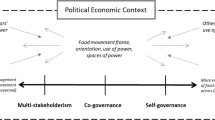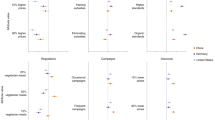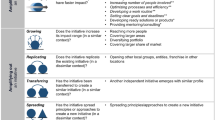Abstract
There has been revived scholarly interest in policy capacity recently. While it is widely assumed that capacity is important for policy performance, it is difficult to separate its impact from the effect of policy instruments to establish whether capacity can produce an independent and positive effect on target group behavior in relation to achieving policy objectives. Undertaking a critical case study where policy performed well despite the use of weak policy instruments, this paper analyzes whether policy capacity can have a positive independent impact on policy performance. The Danish program to increase the proportion of organic food served in public sector kitchens demonstrates that policy capacity can independently influence policy performance. It can compensate for the weakness of soft and indirect policy instruments and bring about policy performance that goes beyond what can be expected, given the limited ability of the instruments to stimulate behavioral change. A high level of capacity was achieved by drawing on resources possessed by interest groups. While interest groups’ and other private actors’ positive contribution to policy capacity is recognized, only a limited number of studies have analyzed how such actors contribute to capacity generation. Therefore, this paper applies a sectoral perspective in which policy capacity is understood as the ability to pool and coordinate relevant resources available within a policy sector.
Similar content being viewed by others
Notes
Includes certification of kitchens in the private sector.
Troels V. Østergaard served on the Council as the representative of the Consumer Council from 1987 to 97.
https://kbh-madhus.webflow.io/omos/voreshistorie, accessed 19 December 2019.
The Organic School continued to exist long after the conversion program initiative (Økologi & Erhverv, 2017, issue 619: 20).
References
Ansell, C., & Gash, A. (2008). Collaborative governance in theory and practice. Journal of Public Administration Research and Theory, 18(4), 543–571.
Ansell, C., Sørensen, E., & Torfing, J. (2017). Improving policy implementation through collaborative policymaking. Policy & Politics, 45(3), 467–486.
Bajpai, K., & Chong, B. (2019). India’s foreign policy capacity. Policy Design and Practice, 2(2), 137–162.
Bali, A. S., Capano, G., & Ramesh, M. (2019). Anticipating and designing for policy effectiveness. Policy & Society, 38(1), 1–13.
Bali, A. S., & Ramesh, M. (2018). Policy capacity: a design perspective. In M. Howlett & I. Mukherjee (Eds.), Routledge handbook of policy design (pp. 331–344). Routledge.
Beach, D., & Pedersen, R. B. (2019). Process tracing methods-foundation and guidelines. University of Michigan Press.
Biesbroek, R., & Candel, J. J. L. (2020). Mechanisms for policy (dis)integration: Explaining food policy and climate change adaptation policy in the Netherlands. Policy Sciences, 53(1), 61–84.
Capano, G., & Lippi, A. (2017). How policy instruments are chosen: Patterns of decision makers’ choices’. Policy Sciences, 50(2), 269–293.
Capano, G., & Lippi, A. (2021). Decentralization, policy capacities, and varieties of first health response to the COVID-19 outbreak: Evidence from three regions in Italy. Journal of European Public Policy, 28(8), 1197–1218.
Capano, G., Pritoni, A., & Vicentini, G. (2020). Do policy instruments matter? Governments’ choice of policy mix and higher education performance in Western Europe. Journal of Public Policy, 40(3), 375–401.
Ćetković, S. (2015). Policy capacity for promoting green sectors reconsidered: Lessons from the renewable electricity and organic farming sectors in Serbia. Journal of Environmental Policy & Planning, 17(1), 65–83.
Christensen, T., Lægreid, P., & Rykkja, L. H. (2016). Organizing for crisis management: Building governance capacity and legitimacy. Public Administration Review, 76(6), 887–897.
Daugbjerg, C. and Schvartzman, Y. (2022). Organic food and farming policy in Denmark: Promoting a transition to green growth. In C. de La Porte, G. B. Eydal, J. Kauko, D. Nohrstedt, P. ‘t Hart & B. S. Tranøy (Eds.), Successful public policy: Lessons from the Nordic countries. Oxford University Press, forthcoming 2022.
Daugbjerg, C., Fraussen, B., & Halpin, D. (2018). Interest groups policy capacity: Modes of engagement, policy goods and networks. In X. Wu, M. Howlett, & M. Ramesh (Eds.), Policy capacity and governance: assessing governmental competences and capabilities in theory and practice (pp. 243–261). Palgrave Macmillan.
Daugbjerg, C., & Halpin, D. (2010). Generating policy capacity in emerging green industries: The development of organic farming in Denmark and Australia. Journal of Environmental Policy & Planning, 12(2), 141–157.
Daugbjerg, C., & Sønderskov, K. M. (2012). Environmental policy performance revisited: Designing effective policies for green markets. Political Studies, 60(2), 399–418.
Det økologiske erhvervsteam (2017). Økologi i Danmark-vækst og udvikling i hele danmark: anbefalinger fra det økologiske erhvervsteam, http://mfvm.dk/fileadmin/user_upload/MFVM/Landbrug/Oekologi/13538_MFVM_Okologirapport_A4_Forside_V5_WEB_100dpi.pdf (accessed 18. maj 2018).
Fobé, E., Valérie Pattyn, V., Brans, M., & Aubin, D. (2018). Policy analytical practice investigated: Exploring sectoral patterns in use of policy analytical techniques. In X. Wu, M. Howlett, & M. Ramesh (Eds.), Policy capacity and governance: Assessing governmental competences and capabilities in theory and practice (pp. 179–202). Palgrave.
Fødevareministeren. (2011). En ny stærk økologipolitik–på vej mod grøn omstilling: Fødevareministerens økologipolitiske udspil, November 2011: Copenhagen: Ministeriet for Fødevarer, landbrug og fiskeri.
Fødevarestyrelsen. (2011). Notat om Økologisk Landsforening og Københavns Madhus initiativ for sund og økologisk mad i Danmarks offentlige institutioner. J.nr.: 2011-20-261-01759/, 4. November 2011, unpublished memorandum.
Fødevarestyrelsen. (2012a). Det offentlige køkken som nationalt økologisk fyrtårn - Fødevareministeriets koncept for de offentlige køkkener som katalysator for økologisk omlægning af landbrugsarealet 2012a-2020. Fødevarestyrelsen, endeligt udkast /6. juni 2012a
Fødevarestyrelsen. (2012b). Kommunikationsplan: Det offentlige køkken som nationalt økologisk fyrtårn (Køkkenprojektet) 2012b–2020. 14. juni 2012b.
Fødevarestyrelsen. (2012c). Konceptbeskrivelse: Det offentlige køkken som nationalt økologisk fyrtårn-Fødevareministeriets koncept for de offentlige køkkener som katalysator for økologisk omlægning af landbrugsarealet 2012c-2020. Ministeriet for Fødevarer, Landbrug og Fiskeri, Fødevarestyrelsen.
Fødevarestyrelsen. (2012d). Skitse og organisation for projektet: De offentlige køkkener som lokomotiv for økologisk omstilling 2012d-2020. 6 January 2012d, 1. udkast, unpublished archival material.
Fødevarestyrelsen. (2012e). Udkast: Skitse og organisation for projektet: De offentlige køkkener som lokomotiv for økologisk omstilling 2012e–2020. 16 January 2012e, 1. udkast, unpublished archival material.
Fødevarestyrelsen. (undated). Det økologiske Danmarkskort. Unpublished material.
Förster, J. J., Downsborough, L., Biber-Freudenberger, L., et al. (2021). Exploring criteria for transformative policy capacity in the context of South Africa’s biodiversity economy’. Policy Sciences, 54(1), 209–237.
Gerlak, A, Heikkila, T. & Lubell, M. (2013). The Promise and performance of collaborative governance. In M. E. Kraft & S. Kamieniecki, (Eds.), The Oxford Handbook of U.S. Environmental Policy. Oxford Handbooks Online.
Gunningham, N. (2009). The new collaborative environmental governance: The Localization of Regulation. Journal of Law and Society, 36(1), 145–166.
Gunningham, N., & Sinclair, D. (1999). Regulatory pluralism: Designing policy mixes for environmental protection. Law & Policy, 21(1), 49–76.
Howlett, M., Ramesh M., & Perl A. (2020). Studying public policy: Principles and processes (4th edn.). Oxford University Press.
Howlett, M. (2009). Governance modes, policy regimes and operational plans: A multi-level nested model of policy instrument choice and policy design. Policy Sciences, 42(1), 73–89.
Howlett, M. (2015). Policy analytical capacity: The supply and demand for policy analysis in government. Policy and Society, 34(3–4), 173–182.
Howlett, M. (2018). Matching policy tools and their targets: Beyond nudges and utility maximisation in policy design. Policy & Politics, 46(1), 101–124.
Howlett, M., & del Rio, P. (2015). The parameters of policy portfolios: Verticality and horizontality in design spaces and their consequences for policy mix formulation. Environment and Planning C: Government and Policy, 33(5), 1233–1245.
Howlett, M., Mukherjee, I., & Woo, J. J. (2015). From tools to toolkits in policy design studies: The new design orientation towards policy formulation research. Policy & Politics, 43(2), 291–311.
Howlett, M., & Ramesh, M. (2016). Achilles’ heels of governance: Critical capacity deficits and their role in governance failures. Regulation & Governance, 10(4), 301–313.
Jordan, A., Benson, D. Wurzel, R. & Zito, A. (2011). Policy instruments in practice. In J. S. Dryzek, R. B. Norgaard, & D. Schlosberg (Eds.), The Oxford handbook of climate change and society, Oxford University Press.
Kay, A., & Baker, P. (2015). What can causal process tracing offer to policy studies? A review of the literature. Policy Studies Journal, 43(1), 1–21.
Kristensen N. H., Nielsen, T. & Mikkelsen, B. E. (2002). Anvendelsen af økologiske fødevarer i kommuner og amter. Fødevarestyrelsen.
Krogh, L. H., Hansen, M. W., & Dal, J. K. (2013). Kvalitativ undersøgelse af økologi offentlige køkkener: Fra beslutning til praksis. Aalborg Universitet.
Law No. (1987). 363 (1987) Lov om økologisk jordbrugsproduktion, Lovtidende A.
Lynggaard, K. S. C. (2001). The farmer within an institutional environment. Comparing Danish and Belgian organic farming. Sociologia Ruralis, 41(1), 85–111.
Mavrot, C., Hadorn, S., & Sager, F. (2019). Mapping the mix: Linking instruments, settings and target groups in the study of policy mixes. Research Policy, 48(10).
Mazepus, H. (2018). Does political legitimacy matter for policy capacity? In X. Wu, M. Howlett, & M. Ramesh (Eds.), Policy capacity and governance: Assessing governmental competences and capabilities in theory and practice (pp. 229–242). Palgrave.
Meckling, J., & Nahm, J. (2018). The power of process: State capacity and climate policy. Governance, 31(4), 741–757.
Michelsen, J. (2004). Miljø-regulering mellem faglig og politisk rationalitet–med landbrug som eksempel. In W. Søgaard (Ed.), Miljøet og økonomien: I samfunds- og erhvervsøkonomisk perspektiv (pp. 203–252). Syddansk Universitetsforlag.
Ministeriet for Fødevarer, Landbrug og Fiskeri (2012). Økologisk Handlingsplan 2020. Copenhagen: Ministeriet for Fødevarer, Landbrug og Fiskeri
Mukherjee, I. & Bali, A.S. (Eds.). (2019a). Perspectives on Capacity and Effectiveness in Policy Design. Special issue in Policy Design and Practice, 2(2).
Mukherjee, I., & Bali, A. S. (2019b). Policy effectiveness and capacity: Two sides of the design coin. Policy Design and Practice, 2(2), 103–114.
Mukherjee, I., Coban, M. K., & Bali, A. S. (2021). Policy capacities and effective policy design: A review. Policy Science, 54(2), 243–268.
Nationalt Center for Miljø og Energi (2017). Evaluering af kloge fødevareindkøb: Lokale og økologiske offentlige fødevareindkøb, Nationalt Center for Miljø og Energi nr. 229. Aarhus Universitet.
Niras (2014). Erfaringsopsamling mht. redskaber og undervisningsmateriale til økologiomlægning i offentlige køkkener. Fødevarestyrelsen.
Økologi og Erhverv, Various issues.
Olejniczak, K., Śliwowski, P., & Trzciński, R. (2018). The role of analysts in public agencies: Toward an empirically grounded typology. In X. Wu, M. Howlett, & M. Ramesh (Eds.), Policy capacity and governance: Assessing governmental competences and capabilities in theory and practice (pp. 151–178). Palgrave.
Operate (2014). Evaluering og udvikling af den danske økologiindsats–den økologiske vej mod 2020. NaturErhvervstyrelsen, Ministeriet for Fødevarer og Landbrug og Fiskeri.
Østergaard, T. V. (2003). Dilemmaer og valg i økologiens første år. In J. H. Ingemann (Ed.) Økologisk landbrug mellem historie og principper (pp. 28–32). Arbejdspapir 2003: 3. Institut for økonomi, politik og forvaltning.
Økologi, & Erhverv. (2012). Issues 494, 503, 506, 508, 511.
Økologi, & Erhverv. (2013). Issues 518, 520, 529.
Økologi, & Erhverv. (2017). Issue 619.
Painter, M., & Pierre, J. (2005). Unpacking policy capacity: Issues and themes. In M. Painter & J. Pierre (Eds.), Challenges to state policy capacity: Global trends and comparative perspectives (pp. 1–18). Palgrave.
Peters, B. G. (2005). Policy instruments and policy capacity. In M. Painter, & J. Pierre (Eds.), Challenges to state policy capacity: Global trends and comparative perspectives. Palgrave, pp. 71–93.
Peters, B. G. (2015). Policy capacity in public administration. Policy & Society, 34(3–4), 219–228.
Peters, B. G., Fontaine, G., & Mendez, J.-L. (2018). Substance and methods in the comparative study of policy change. Journal of Comparative Policy Analysis, 20(2), 133–141.
Ramesh, M., Howlett, M, & Wu, X. (Eds.) (2015). The dynamics of policy capacity. Special issue in Policy & Society, 34(3–4).
Scharpf, F. (1994). Games real actors could play: Positive and negative coordination in embedded negotiations. Journal of Theoretical Politics, 6(1), 27–53.
Schvartzman, Y. (2012). Metastyring af markedsudvikling: Policystrategier og netværkskoordinering i udvikling af nye markeder: Et komparativt studie af udviklingen af det danske og det svenske økologimarked. Forlaget Politica.
Scott, T. (2015). Does collaboration make any difference? Linking collaborative governance to environmental outcomes. Journal of Policy Analysis and Management, 4(3), 537–566.
Sørensen, N. N., Tetens, I., Løje, H., & Lassen, A. D. (2016). The effectiveness of the Danish Organic Action Plan 2020 to increase the level of organic public procurement in Danish public kitchens. Public Health Nutrition, 19(18), 3428–3435.
Strukturdirektoratet (1999). Aktionsplan II: Økologi i udvikling. Strukturdirektoratet.
van Gossum, P., Arts, B., & Verheyen, K. (2010). From ‘smart regulation’ to ‘regulatory arrangements.’ Policy Sciences, 43(3), 245–261.
Vedung, E. (1998). Policy instruments: Typologies & theories. In M. Bemalmans-Videc, R. C. Rist, & E. Vedung (Eds.), Carrots, sticks & sermons: Policy instruments and their evaluation (pp. 21–58). Transaction Books.
Wellstead, A. M., Stedman, R. C., & Howlett, M. (2011). Policy analytical capacity in changing governance contexts: A structural equation model (SEM) study of contemporary Canadian policy work. Public Policy and Administration, 26(3), 353–373.
Williams, R. A., & McNutt, K. (2013). Climate change adaptation and policy capacity in the Canadian finance sector: A meso analysis. Review of Policy Research, 30(1), 91–113.
Woo, J. J., Ramesh, M., & Howlett, M. (2015). Legitimation capacity: System-level resources and political skills in public. Policy and Society, 34(3–4), 271–283.
Wu, X, Howlett, M. & Ramesh, M. (Eds.) (2018b). Policy capacity and governance: Assessing governmental competences and capabilities in theory and practice: Palgrave.
Wu, X., Howlett, M., & Ramesh, M. (2018a). Policy capacity: Conceptual framework and essential components. In X. Wu, M. Howlett, & M. Ramesh (Eds.), Policy capacity and governance: Assessing governmental competences and capabilities in theory and practice (pp. 1–23). Palgrave.
Wu, X., Ramesh, M., & Howlett, M. (2015). Policy capacity: a conceptual framework for understanding policy competences and capabilities. Policy and Society, 34(3–4), 165–171.
Zehavi, A. (2012). New governance and policy instruments: Are governments going ‘soft’. In D. D. Levi-Faur (Ed.), The Oxford Handbook of Governance (pp. 242–254). Oxford University Press.
Acknowledgments
This is a revised version of a paper presented at the ECPR General Conference, virtual event, August 2020. I thank the participants at this event and in particular Gerry Alons, Yonatan Schvartzman and the two reviewers of this journal for constructive comments helping me to improve the paper. I would also like to thank Stuart Wright for language editing and the interviewees for providing valuable information and insights. The research was conducted under the public service contract between the Danish Ministry of Food, Agriculture and Fisheries and the Department of Food and Resource Economics, University of Copenhagen. The arm’s-length principle applies to such research.
Author information
Authors and Affiliations
Corresponding author
Additional information
Publisher's Note
Springer Nature remains neutral with regard to jurisdictional claims in published maps and institutional affiliations.
Rights and permissions
Springer Nature or its licensor holds exclusive rights to this article under a publishing agreement with the author(s) or other rightsholder(s); author self-archiving of the accepted manuscript version of this article is solely governed by the terms of such publishing agreement and applicable law.
About this article
Cite this article
Daugbjerg, C. Against the odds: How policy capacity can compensate for weak instruments in promoting sustainable food. Policy Sci 55, 451–467 (2022). https://doi.org/10.1007/s11077-022-09466-2
Accepted:
Published:
Issue Date:
DOI: https://doi.org/10.1007/s11077-022-09466-2




